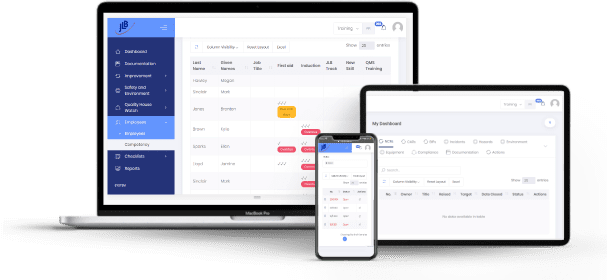
What is Food Safety System Certification?
While many clients are certified against HACCP or ISO 22000, businesses are increasingly being encouraged to be certified against FSSC 22000 (Food Safety System Certification). This is because many retailers now require their suppliers to hold a Food Safety Management System Certificate that is recognised by the Global Food Safety Initiative (GFSI).
FSSC 22000 (Food Safety System Certification) is a certification scheme for food manufacturers that incorporates ISO 22000:2018 (Food Safety Management Systems requirements) with an emphasis on compliance with the respective industry Prerequisite Program (PRP) recognised by the GFSI. It provides a framework for effectively managing food safety hazards and ensuring the production of safe food products. FSSC 22000 certification is internationally recognised and demonstrates a company's commitment to producing safe and high-quality food products.
The following Prerequisite Programs (PRPs) are included in the FSSC Scheme:
- Food manufacturing
- Catering
- Farming
- Food packaging
- Transport & Storage
- Feed & Animal Production
- Retail
What is the FSSC 22000 Certification?
FSSC 22000 (Food Safety System Certification 22000) is a globally recognised certification scheme for food safety management systems (FSMS). It provides a comprehensive framework for ensuring food safety throughout the entire food supply chain, from primary production to manufacturing, processing, distribution, and retail.
FSSC 22000 is based on ISO 22000:2018, which outlines the requirements for a food safety management system, combined with additional requirements specified by Foundation FSSC (the Scheme Owner). The scheme incorporates ISO 22000 standards, as well as prerequisite programs (PRPs), such as Good Manufacturing Practices (GMP), Good Hygiene Practices (GHP), and Hazard Analysis and Critical Control Points (HACCP), among others.
The certification process involves an independent assessment by accredited certification bodies to ensure compliance with FSSC 22000 requirements. This assessment includes a review of the organization's food safety management system, documentation, procedures, and practices to verify that they meet the necessary standards.
Why transition from ISO 22000 to FSSC 22000?
Certifying your business to FSSC 22000 demonstrates a commitment towards having a food safety management system in place to meet the requirements of regulators, partners, and consumers. It establishes and reinforces credibility in the competitive landscape of the food industry. By running your business operations to the standards required of FSSC 22000 standards, you signal to consumers, suppliers, and stakeholders that food safety is of the greatest importance to your business principles.
FSSC 22000 offers two notable advantages over the ISO 22000 standard. Firstly, the Global Food Safety Initiative (GFSI) has endorsed the FSSC 22000 Scheme through its annual benchmarking process. This recognition provides expanded business opportunities for organisations certified under FSSC 22000 in both domestic and international markets. Additionally, FSSC 22000 boasts a robust integrity program, ensuring the utmost trust and reliability within the consumer goods industry.
- Global Food Safety Initiative (GFSI) recognised
- Specifically designed certification scheme
- Reduces barriers to entry of greater markets and vendors
- Tailored for the food and beverage industry
- Based on ISO 22000 but a specific certification scheme
- Powerful management system which is easily integrated with other systems such as ISO 9001 & ISO 14001
What are the benefits of the Food Safety System Certification 22000?
Obtaining the Food Safety Certification FSSC 22000 offers numerous benefits for food businesses. Firstly, it enhances credibility by demonstrating adherence to internationally recognized food safety standards and instilling trust among consumers, customers, and regulatory bodies. Compliance with relevant food safety regulations is assured, reducing the risk of non-compliance penalties and legal issues. Additionally, FSSC certification opens doors to new markets and business opportunities, as many retailers, distributors, and food service providers require suppliers to have such certifications. This global recognition meets the requirements of major industry players, facilitating market access and expansion.
Implementing FSSC standards involves rigorous assessment and improvement of food safety practices within the organization. This leads to better risk management, hazard control, and overall safety of food products. By minimizing the risk of food contamination, FSSC certification helps ensure product safety and quality, reducing the likelihood of foodborne illnesses and product recalls. Consequently, cost savings are achieved by preventing incidents and recalls, saving on lost production, legal fees, and damage to brand reputation.
FSSC certification fosters a culture of continuous improvement within the organization, driven by regular audits and assessments. This encourages ongoing enhancement of food safety practices, ensuring they remain effective and up to date. Displaying the FSSC certification logo on products enhances consumer confidence, leading to increased loyalty and repeat business. Additionally, having FSSC certification provides a competitive advantage, differentiating the business from competitors who may lack such credentials. With its global recognition, FSSC 22000 facilitates international business, ensuring consistency in food safety practices across different regions.
Certifying to FSSC 22000 can benefit your business and assist it to:
- enhance credibility and trustworthiness
- align with globally recognised food safety standards
- ensure compliance with regulatory requirements
- access to new markets and business opportunities
- minimise risk of food contamination and increased product safety and quality
- improve cost savings by preventing food safety incidents
- improve consumer confidence and brand reputation
- offer a competitive advantage
- facilitate international trade and expansion
- foster a corporate culture of continuous improvement
How can JLB assist you
JLB supports clients throughout the entire certification process and provides you with practical tools and techniques to improve your food safety and quality management. FSSC 22000 requires appropriately accredited certification bodies to only use superior food safety experts who have undergone appropriate training. JLB offers the combined ISO 22000 & FSSC 22000 Lead Auditor Course, qualifying auditors to audit FSSC 22000 and ISO 22000-based food safety management systems.
- We review your current food safety practices and ensure your business has addressed the basic requirements of food safety
- We then develop the OPRP/CCP Plan and ensure OPRPs & CCPs are effectively monitored
- We ensure your business is complying with the requirements of the respective PRP
- We train all employees in the Food Safety Management System
- We train your Internal Audit Team and conduct the first audit
- We ensure a continual improvement program operates and prepare you for certification
What to expect when you work with JLB on your FSSC
You will work directly with one of our consultants, an expert with relevant industry experience to your business, to identify the structure and requirements of an effective food safety management system and what this means for your business.
You will gain a thorough insight into food safety management systems and the key concepts and structure of ISO 22000. This will include a comprehensive understanding of key terms and definitions used for the ISO standard, as well as the standardised ISO high-level structure. You will acquire the skills to understand, interpret, and implement the core concepts and principles of the standard within your organisation's current processes.
Our professional consultants have a wealth of experience across various industries and share the common goal of providing the best possible service to our clients. Our unique 'Hands On' approach delivers support and guidance at every step.
The FSSC Management System Process
If your business is already an ISO 22000 certified organisation, you will already be familiar with a food safety system framework. JLB will analyse your business’s current management system’s content and guide you through the process of addressing any missing gaps towards your FSSC 22000 certification.
Learn about the international standard and what achieving FSSC 22000 can do for your business
Our experienced, committed and dedicated team tailors a program to suit your individual needs
Third party assessment to gain certification for your Food Safety Management System
JLB is available to maintain your system to ensure compliance and continual improvement
FSSC Documentation
Like any other management system, JLB knows that effective documentation is essential to be certified in compliance with the FSSC 22000 Standard. By working closely with our clients, we coordinate their documentation preparation requirements and prerequisite programs, ensuring that the transition to FSSC 22000 from ISO 22000 runs smoothly.
Requirements for the FSSC 22000 Food Safety Management System
Implementing a Food Safety Management System (FSMS) for FSSC 22000 certification involves several key steps. Firstly, organizations must thoroughly understand both external and internal factors relevant to food safety, as well as the interests of stakeholders involved. Following this, a Food Safety Policy, typically a concise document, is developed, declaring the organization's unwavering commitment to food safety. A crucial step involves appointing a dedicated Food Safety Team to oversee the implementation and maintenance of the FSMS.
Next, organizations develop and implement a comprehensive Hazard Control Plan, addressing potential risks and outlining control measures. This plan is incorporated into a FSMS or Management Manual, which succinctly addresses the clauses of ISO 22000 and specific requirements of FSSC 22000. Food safety practices are then implemented to address prerequisite programs (PRPs), ensuring a foundational level of safety throughout operations.
Detailed procedures are developed for critical control points (CCPs) and operational prerequisite programs (OPRPs), with stringent record-keeping protocols in place for monitoring their effectiveness. Organizations establish and monitor food safety objectives and targets, actively identifying and addressing risks and opportunities within their operations. Plans for Food Defence (eg. TACCP) and Food Fraud Mitigation (eg. VACCP) are developed and implemented to safeguard against intentional contamination.
Continuous monitoring of food safety performance is essential, alongside preparedness for food safety emergencies. Staff competence is ensured through comprehensive training programs, with clear delineation of responsibilities regarding food safety. Nonconformances are identified, controlled, and corrected promptly, with a focus on both internal and external communication of food safety issues.
Additionally, evaluation and monitoring of external providers are conducted to ensure adherence to food safety standards. Special attention is given to allergen management, with robust programs in place to mitigate risks. Verification of the Hazard Control Plan and PRPs is regularly carried out, supplemented by internal audits of the FSMS. Senior management plays a pivotal role in strategically reviewing the FSMS, ensuring its alignment with organizational goals and objectives.
Lastly, organizations implement a risk-based environmental monitoring program to further enhance food safety measures. Overall, by meticulously following these steps and embracing a culture of continuous improvement, businesses can successfully achieve and maintain FSSC 22000 certification, demonstrating their unwavering commitment to ensuring the safety and quality of their food products.
Why choose JLB for your FSSC 22000 certification?
- Australian-based
- Experienced consultants
- Tailored systems
- Straightforward implementation
- Maintenance of your Food Safety Management Plan
- Internal Auditing Training
- Integration with other standard
Certifying your business to FSSC 22000, the globally recognized Food Safety Management System Certification, is a pivotal step towards establishing and reinforcing credibility in the competitive landscape of the food industry. This certification serves as a powerful testament to your unwavering commitment to upholding the highest standards of food safety and quality.
For over 30 years, JLB has assisted over 1,000 organisations to achieve their management system certifications. This also includes Food Safety Management System Certifications, and transitioning from ISO 22000 to FSSC 2200 certification.
If you're ready to find out more about how international FSSC 2200 certification can help your business, contact the JLB Team at info@jlb.com.au.

